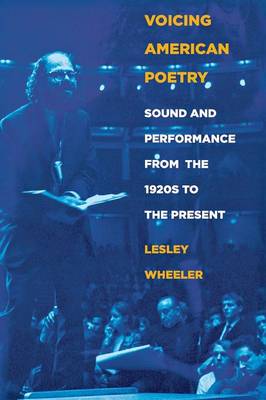10%OFF

Stock image for illustration purposes only - book cover, edition or condition may vary.
Voicing American Poetry: Sound and Performance from the 1920s to the Present
Lesley Wheeler
€ 37.99
€ 34.27
FREE Delivery in Ireland
Description for Voicing American Poetry: Sound and Performance from the 1920s to the Present
Paperback. Num Pages: 248 pages, black & white illustrations. BIC Classification: 1KBB; 2AB; DSBH; DSC. Category: (G) General (US: Trade). Dimension: 153 x 303 x 17. Weight in Grams: 340.
The most interesting tensions and ambitions of twentieth-century American poetry intersect in one resonant word: voice. The term poetic voice emphasizes poetry's reliance on sound, which is prominent in ethnic American writings, new formalism, and many species of performance and sound-directed poetry, both mainstream and avant-garde. However, voice is also a metaphor for originality, personality, and the illusion of authorial presence within printed poetry-meanings that have been particularly useful (and provocative) in literary criticism and creative writing. In Voicing American Poetry, Lesley Wheeler explores how and why American poetry of the twentieth century and beyond keeps returning to ... Read more
The most interesting tensions and ambitions of twentieth-century American poetry intersect in one resonant word: voice. The term poetic voice emphasizes poetry's reliance on sound, which is prominent in ethnic American writings, new formalism, and many species of performance and sound-directed poetry, both mainstream and avant-garde. However, voice is also a metaphor for originality, personality, and the illusion of authorial presence within printed poetry-meanings that have been particularly useful (and provocative) in literary criticism and creative writing. In Voicing American Poetry, Lesley Wheeler explores how and why American poetry of the twentieth century and beyond keeps returning to ... Read more
Product Details
Publisher
Cornell University Press
Format
Paperback
Publication date
2008
Condition
New
Weight
339g
Number of Pages
248
Place of Publication
Ithaca, United States
ISBN
9780801474422
SKU
V9780801474422
Shipping Time
Usually ships in 7 to 11 working days
Ref
99-1
Reviews for Voicing American Poetry: Sound and Performance from the 1920s to the Present
Voicing American Poetry is a bold and original work of poetics. Its readability will ensure broad appeal, and its significant new thinking will catalyze lively debate. Its methods (including participant observation) are fresh and exciting, and the sharp intelligence that drives the argument in Voicing American Poetry will surely change our thinking about poetry and voice for years to come. ... Read more
